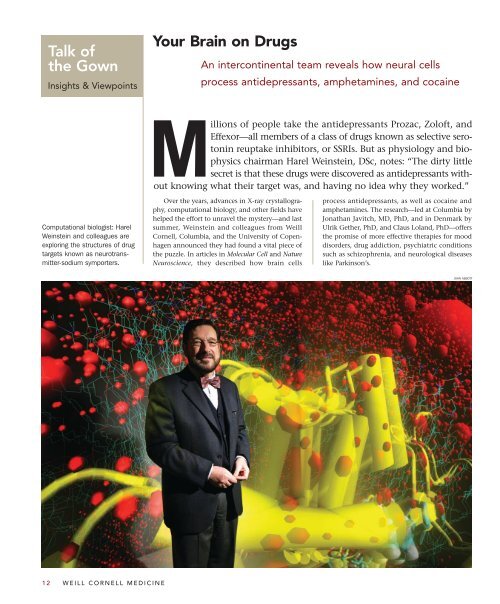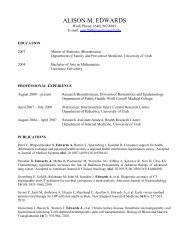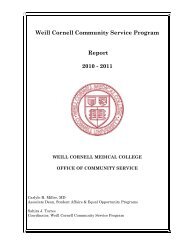Weillcornellmedicine - Weill Medical College - Cornell University
Weillcornellmedicine - Weill Medical College - Cornell University
Weillcornellmedicine - Weill Medical College - Cornell University
You also want an ePaper? Increase the reach of your titles
YUMPU automatically turns print PDFs into web optimized ePapers that Google loves.
Talk of<br />
the Gown<br />
Insights & Viewpoints<br />
Computational biologist: Harel<br />
Weinstein and colleagues are<br />
exploring the structures of drug<br />
targets known as neurotransmitter-sodium<br />
symporters.<br />
12 WEILL CORNELL MEDICINE<br />
Your Brain on Drugs<br />
An intercontinental team reveals how neural cells<br />
process antidepressants, amphetamines, and cocaine<br />
Millions of people take the antidepressants Prozac, Zoloft, and<br />
Effexor—all members of a class of drugs known as selective serotonin<br />
reuptake inhibitors, or SSRIs. But as physiology and biophysics<br />
chairman Harel Weinstein, DSc, notes: “The dirty little<br />
secret is that these drugs were discovered as antidepressants without<br />
knowing what their target was, and having no idea why they worked.”<br />
Over the years, advances in X-ray crystallography,<br />
computational biology, and other fields have<br />
helped the effort to unravel the mystery—and last<br />
summer, Weinstein and colleagues from <strong>Weill</strong><br />
<strong>Cornell</strong>, Columbia, and the <strong>University</strong> of Copenhagen<br />
announced they had found a vital piece of<br />
the puzzle. In articles in Molecular Cell and Nature<br />
Neuroscience, they described how brain cells<br />
process antidepressants, as well as cocaine and<br />
amphetamines. The research—led at Columbia by<br />
Jonathan Javitch, MD, PhD, and in Denmark by<br />
Ulrik Gether, PhD, and Claus Loland, PhD—offers<br />
the promise of more effective therapies for mood<br />
disorders, drug addiction, psychiatric conditions<br />
such as schizophrenia, and neurological diseases<br />
like Parkinson’s.<br />
JOHN ABBOTT












